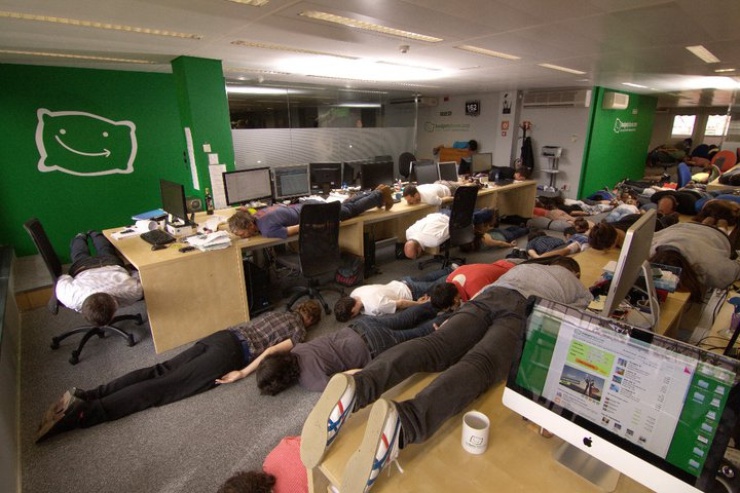
Brussels: Spanish expat on depression taboo
Published on
Translation by:
Cafebabel ENG (NS)Brussels is home to over 25, 000 employees of the European institutions, some of whom are reputed to suffer from stress and drink addictions. One employee confirms the myth
Margarita* is Spanish. She moved to Belgium fifteen years ago for her studies, and ended up marrying and staying here. So even if working at the heart of the European union in Brussels wasn’t her main motivation for being in the capital, she ended up passing the rounds anyway. She spent many years at the same 'directorate-general' until she was moved to a different division three years ago. ‘Every seven years you are encouraged to move around the departments of the European commission,’ she explains. New bosses, colleagues and responsibilities led to her ‘burning out’. ‘I started having insomnia because of stress. I had a lot more financial responsibilities at work and I didn’t feel ready for that. I was sleeping and eating badly and I didn’t think I would be able to make it.’
Being one of the best in Brussels
One out of three Europeans suffer from illnesses associated with the brain, according to a recent report. Insomnia and depression count as some of the problems associated with this. Margarita claims that she was feeling alienated from her colleagues and complains that she wasn’t specifically trained for her role. She felt she had been thrown into the ring and was forced to prove herself as soon as she could. She describes herself as a perfectionist, and didn’t want to drop the juggling act that is maintaining a young family. ‘I was always very good at school and I tried to be one of the best at the European commission too. The problem is that it is hard to be ‘one of the best of the best’ there. I was very career-oriented at the beginning but I changed a lot. I was satisfied with the path I had taken and I was very into my family too.’

Margarita believes many women have gone through a similar dilemma. ‘Many of my female colleagues were putting their career in parentheses for a few years and it was hard to juggle being a mother as well as a career woman.’ The problem was that she didn’t want to speak up about feeling like a victim, as that remained a taboo in the professional world. ‘I didn’t know how to talk about how I felt. You hear people say that others are depressed or suffering from anxiety or getting addicted to alcohol. These are diseases like cancer, but no-one wants to talk about them.’ Margarita feels that precious few are brave enough to talk about things like mental illness. ‘It’s not as evident as having a broken leg; I tried to hide it too.’
One psychiatrist for hundreds of employees
One month of sick leave later, and after visits to the psychiatrist and sophrology (a relaxation technique - ed) sessions, Margarita returned to work and the difficulty of explaining what she had just gone through to her colleagues. Luckily, some of her superiors were supportive. ‘I asked to go part-time (80%) and the request was accepted, but I still had to deal with the same workload in less time.’ The social-medical service of the European commission (as far she knew, one psychiatrist was available for hundreds of employees) told her that no structure was in place for people suffering from depression. ‘It’s not like alcoholics anonymous where you can get help from networks or groups where you can talk to people. It’s really a shame.’
 The worst may be behind her now, but three years on, Margarita says she still feels some of the effects of her burn-out. She continues taking medication for insomnia and still feels weak at work. ‘I simply don’t have the same capacity as I once did for managing stress,’ she says. She has some advice for other young women who may be in her situation: ‘Talk to each other! It’s easy to say but you shouldn’t let your work eat you up, as it were. You have to maintain a balanced life. If you’re far from your family you have to recreate it with circles of friendship and trust.’ Margarita feels more stable than before, her children have grown and she has taken up guitar, a dream she had had of doing since she was an adolescent. In three or four years she will probably have to change departments again but for the moment, she feels more ready than ever to handle that.
The worst may be behind her now, but three years on, Margarita says she still feels some of the effects of her burn-out. She continues taking medication for insomnia and still feels weak at work. ‘I simply don’t have the same capacity as I once did for managing stress,’ she says. She has some advice for other young women who may be in her situation: ‘Talk to each other! It’s easy to say but you shouldn’t let your work eat you up, as it were. You have to maintain a balanced life. If you’re far from your family you have to recreate it with circles of friendship and trust.’ Margarita feels more stable than before, her children have grown and she has taken up guitar, a dream she had had of doing since she was an adolescent. In three or four years she will probably have to change departments again but for the moment, she feels more ready than ever to handle that.
*The person providing this testimony has asked to use a pseudonym
Images: main homepage crop (cc)TimmyGUNZ; European commission (cc) Stuart Chalmers, stressed head (cc) ian boyd/ Flickr, planking in the office (cc) budgetplaces.com/ all courtesy of Flickr
Translated from Les expats à Bruxelles : des dépressifs en puissance ?



